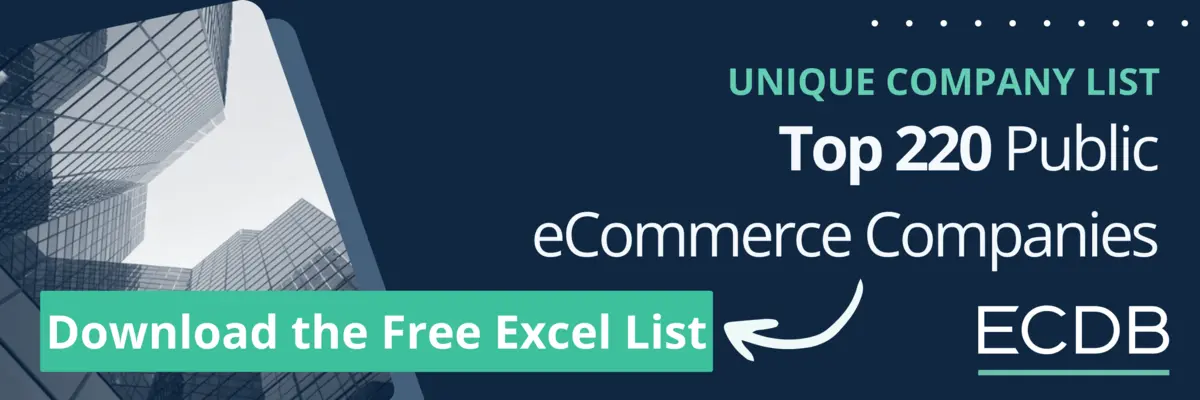eCommerce: Ticketing Industry
What Drives the Online Ticketing Industry and Its Growing Prices?
The online event ticketing market is thriving, the industry is huge: With an increasing number of concerts, blockbuster movies and sporting events, the demand for online tickets grows. At the same time, ticketing prices are higher than ever before. Here is why.
Article by Nadine Koutsou-Wehling | September 26, 20242024 is shaping up to be a landmark year for major live events in both music and sports. With the Super Bowl in February, the European Football Championship in Germany, and the Olympic Games in Paris, sports fans around the world are in for an unforgettable year. Meanwhile, some of the biggest names in music, like Drake, Green Day, and Taylor Swift, are embarking on global tours.
This is a golden opportunity for the ticketing industry, largely fueled by the shift to online platforms due to their convenience and enhanced security. The market is thriving, with ticket prices soaring. Especially for high-demand events like the Super Bowl. Discover the factors driving this surge and explore key statistics on the online ticketing market.
Online Event Tickets: What Is In Scope
Online ticketing typically falls outside the scope of ECDB’s definition of the online market, which focuses on physical goods that are sold online. Nonetheless, online event ticketing accounts for an increasing share of event ticket sales due to its ease of access, speed of transmission, and convenience of use on mobile devices, with the added benefit of promoting a paperless economy.
Therefore, for this article, we expand the scope of our definition to include online ticket sales for a concert or sporting event, as well as movie tickets. In addition, in order for tickets to be considered online purchases, there must be an online checkout process, including paid reservations and digital tickets that are scanned via a QR code.
Museum tickets, cabaret tickets and comedy club tickets are out of scope. Of course, offline ticket purchases at the event or other ticketing venues are neither included in this definition.
Now that we have established what exactly we are referring to when we talk about online ticketing, what is the size of the global market as measured by global revenues?
Online Ticketing Market: Global Revenues
It is important to note that market estimates vary widely. Because they are all based on assumptions, condensing reality into measurable variables leads to different results depending on the market research firm performing the calculations.
Different Estimates From Different Market Researchers
For instance, the estimated figure of global revenue for the online event ticketing market in 2022 ranges from US$34.6 billion from Straits to US$61.9 billion from Statista’s Digital Market Outlook. Similarly, forecasts for 2027 vary between revenues of US$59.6 billion from the Business Reseach Company to US$94.9 billion from Report Linker. Interestingly, the latter estimate is in line with Statista’s prediction of US$92.4 billion.
Mordor Intelligence predicts that global revenues will approach US$100 billion by 2028, while other firms project US$82 billion by 2029 (Maximize Market Research) or, significantly lower than that, US$64.7 billion by 2031 (Straits).
Statista's Digital Market Outlook: Online Event Ticketing Market to Reach US$90 Billion by 2026
The disparity in results between market research firms is a reminder that revenue forecasts should be taken with a grain of salt. However, one thing is clear: the online ticketing market is unanimously expected to grow.
Using data from Statista’s Digital Market Outlook, we can see that while the pandemic had a devastating effect on online event ticket sales, post-pandemic recovery was swift.
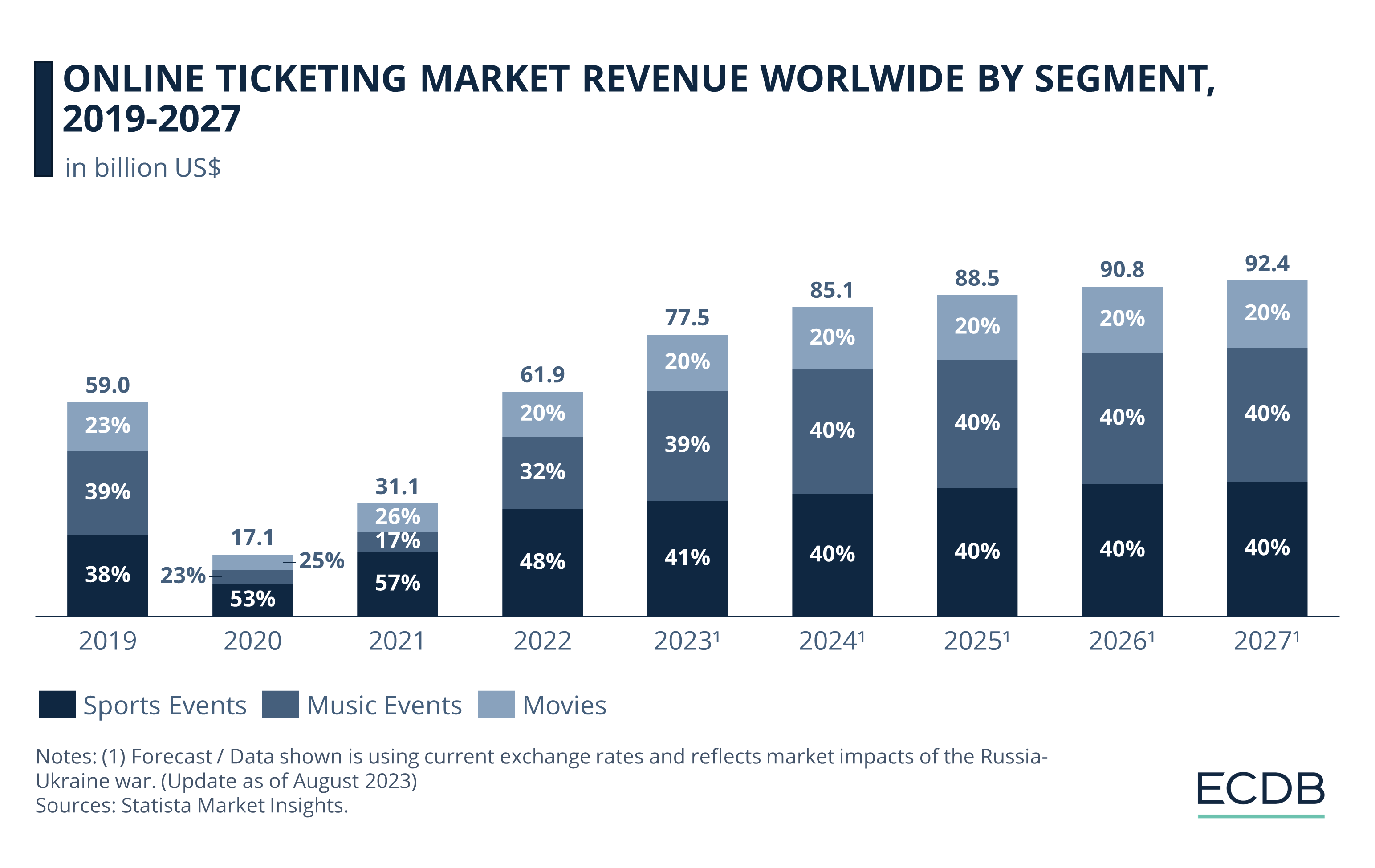
By 2022, the online ticketing market has surpassed pre-pandemic levels, approaching US$70 billion in global revenues. Thereafter, revenues are expected to grow steadily, surpassing US$90 billion in 2026 and increasing to US$92.4 billion in 2027.
In terms of the segments’ share of total revenues, we see that sporting events experienced the most robust development during the pandemic, and still account for almost half of the revenues in 2022, or 48% to be precise.
However, Statista's Market Insights predicts that sports events will lose share in favor of music events, which are expected to reach 40% of total online revenues by 2027, the same share as sports events. Movie tickets, on the other hand, are expected to remain at 20% of total revenues by 2027.
Moving from a global to a national perspective, which countries generate the most revenue and contribute to the continued growth of the global online market?
USA Is the Largest Market for Online Ticketing
Researchers agree that the United States generate the highest revenue in the global online event ticketing market. Statista's projections show the U.S. reaching US$25.5 billion in 2022 and growing to US$39.8 billion in 2027.
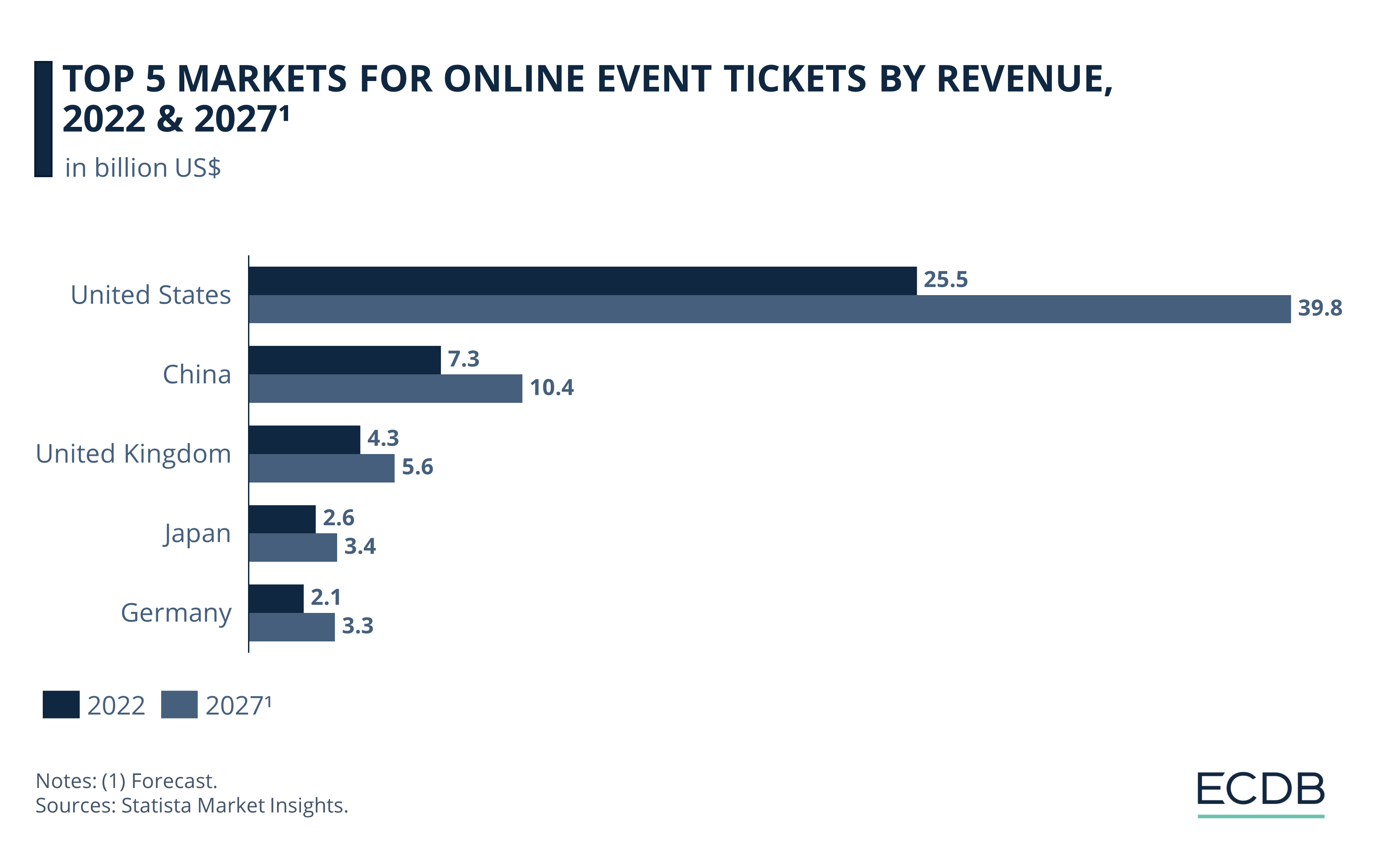
While the U.S. leads with a significant head start in online event ticket sales, China follows in second place with US$7.3 billion in 2022. With projected revenues of US$10.4 billion in 2027, China is expected to consolidate its position as the second largest market for online event tickets, though still well behind the number one spot.
In third place, the United Kingdom generated US$4.3 billion in online ticketing revenues in 2022, rising to US$5.6 billion in 2027. Japan follows with figures of US$2.6 billion in 2022 and a projected US$3.4 billion in 2027, while Germany rounds out the top 5 markets with revenues of US$2.1 billion and US$3.3 billion, respectively.
Since the U.S. is the largest market for online event ticketing, which are the top 10 online ticketing companies according to consumers?
U.S. Consumers Prefer Ticketmaster
The online ticketing market is highly diversified and fragmented, with a variety of players participating, some larger and some smaller. Statista’s Consumer Insights asked U.S. users about the most popular live event ticketing companies for online purchases.
At 60%, Ticketmaster, a subsidiary of Live Nation, is well ahead of second-place StubHub (31%) and Eventbrite (30%).
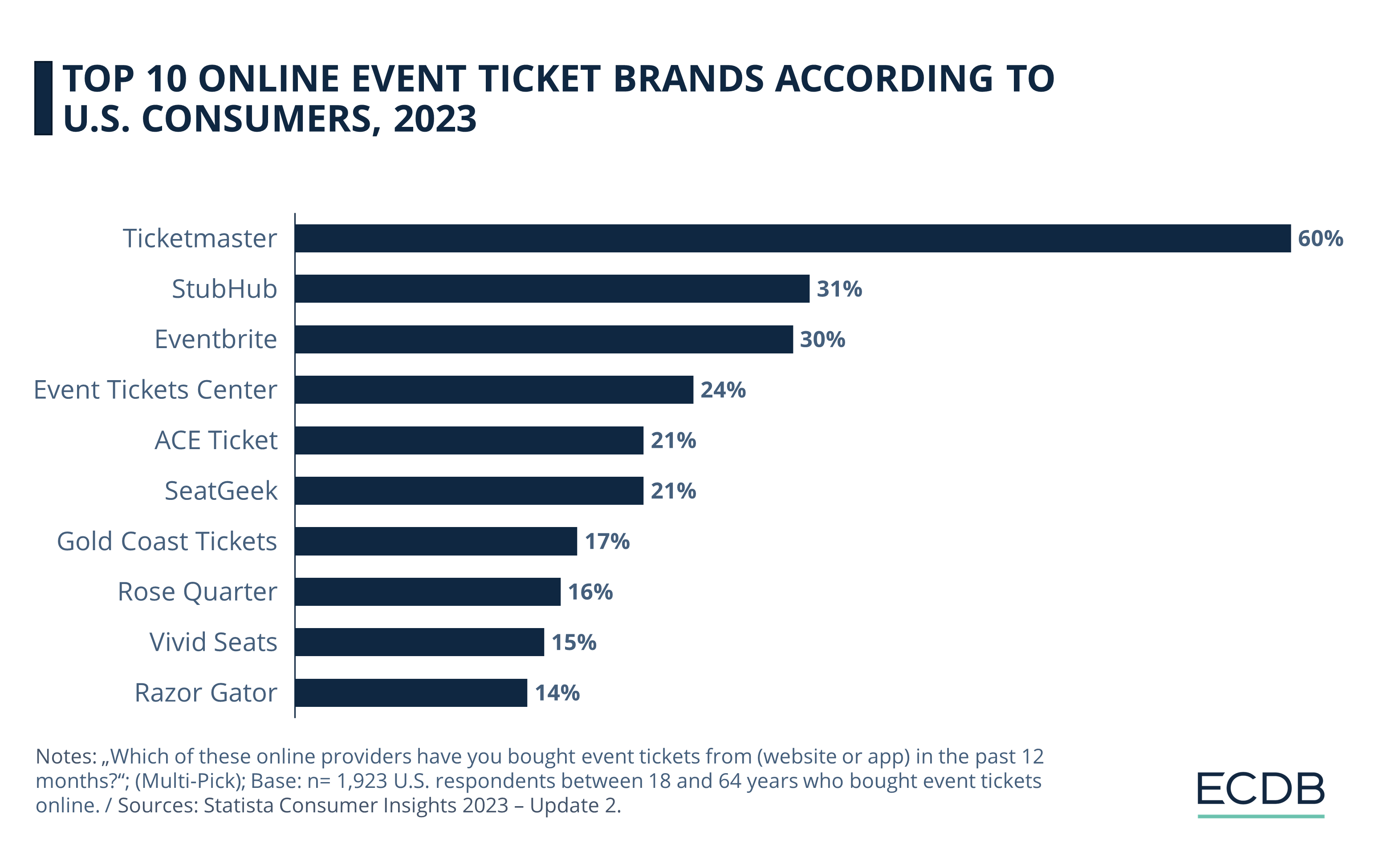
Event Tickets Center ranks fourth with 24% of consumers having used this platform, followed by ACE Ticket and SeatGeek in fifth place with 21% each. Below a 20% user share are Gold Coast Tickets (17%), Rose Quarter (16%), Vivid Seats (15%) and Razor Gator (14%).
Other notable players include
Anschutz Entertainment (U.S.)
Fandango Media (U.S.)
Yapsody (U.S.)
Atom Tickets (U.S.)
TickPick (U.S.)
AOL Inc. (U.S.)
Eventbee (U.S.)
Cvent (U.S.)
Ticket Tailor (UK)
Viagogo (UK)
Ticketek (Australia)
Bigtree Entertainment (India)
Eventim (Germany)
Beijing Weiying Technology (China)
Maoyan (China)
Taobao Movies (China)
Price Hike: A Look at the Super Bowl
As arguably the most coveted sporting event, we examine the case of the Super Bowl, where price increases over the past few decades are most clearly illustrated:
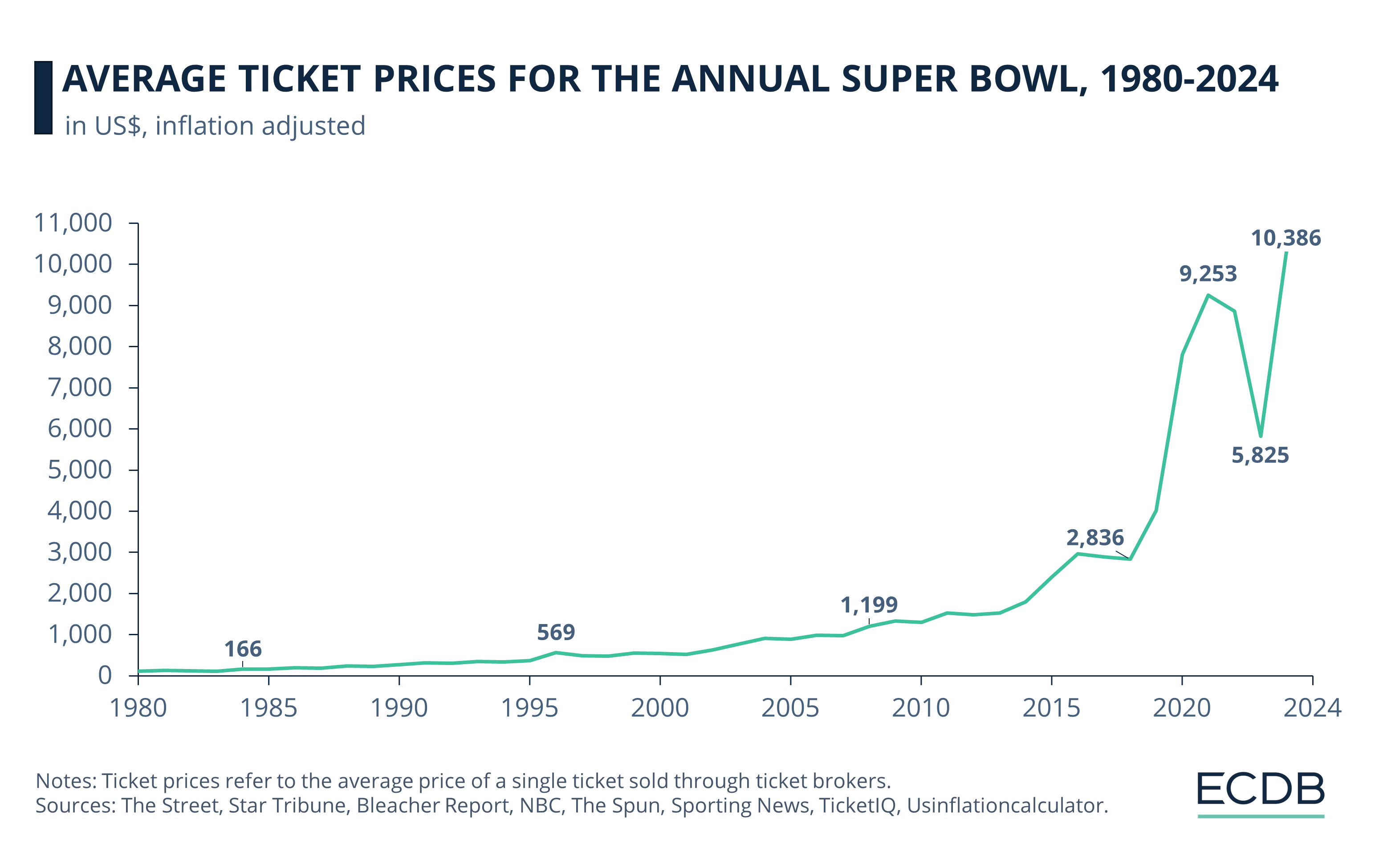
The Super Bowl's pricing trends show how demand-driven prices are: The first event took place in 1967 at an inflation-adjusted price of just US$106, when demand was considerably low. This level continued well into the 1980s, when prices began to rise significantly for the first time.
As the event grew in popularity in the following decade, the 1990s, average prices spiked accordingly. These surges occurred at the same time that the Super Bowl halftime shows became more spectacular and the commercials themselves evolved into an event to watch. Starting at US$569 in 1996, ticket prices just kept going up.
The late 2000s in particular were marked by unaffordability, with prices soaring into the thousands per ticket: Starting at US$1,199 in 2008, rising to US$2,967 in 2016, and reaching a new high in 2020 with an astonishing average of US$7,816 per ticket. In 2021, average ticket prices temporarily peaked at US$9,253 due to restricted access during the pandemic. While prices declined in the subsequent two years, average ticket prices reached another all-time high of US$10,386 in 2024.
The basic economic model of supply and demand is what Dan van Wie of Bleacher Report put it most succinctly back in 2012:
"When you realize that 111 million people were watching Super Bowl XLV last year and that the Dallas Cowboys' stadium seats only 80,000 and then you figure that maybe you can get another 20,000-30,000 fans to come in for temporary seating or standing-room-only, you realize what a small percentage of football fans actually attend a Super Bowl game."
And it is not just the Super Bowl that provides a steady stream of revenue for ticket brokers: Other sporting events such as the European Soccer Championship, the Olympic Games, and concert tours by household names in the music industry, continue to draw crowds to venues.
Common Strategies of Major Online Ticketing Brands
The strategies of online ticketing platforms are as varied as the industry itself. Offering mobile access with a user-friendly interface is a competitive advantage in this market, as online ticketing has moved to mobile in line with consumer demand.
In addition, establishing strategic partnerships with other platforms or signing exclusivity agreements with partner venues helps competitors secure a steady stream of income. Technological innovations, such as the use of blockchain technology or artificial intelligence, prevent fraud and add a layer of convenience to the customer experience.
New entrants like Granted, an online platform that soft-launched in 2021, are focusing on improving the customer experience and using new trends to their advantage. By offering VIP experiences such as meet and greets and backstage access, or creating NFTs to introduce a new form of payment, Granted aims to stand out from the plethora of event ticket providers in this diversified market.
Another innovation is the use of RFID technology to provide contactless access to venues and linking to bank accounts to enable cashless transactions at venues.
Discover Our Data: Our frequently updated rankings provide essential insights to help your business thrive. Wondering which stores and companies are excelling in eCommerce? Interested in the top-performing categories? Find the answers in our rankings for companies, stores, and marketplaces. Stay competitive with ECDB.
The largest online ticketing provider Ticketmaster is no stranger to using innovation, partnerships and consumer preferences to strengthen its position in the market. Let's take a look.
Live Nation Entertainment: Market Dominance
In 2010, Ticketmaster and Live Nation entered into a strategic partnership, creating the merger Live Nation Entertainment. The company was investigated by the U.S. Department of Justice in 2019 for abusing its monopoly position, because Live Nation Entertainment has made some strategic moves that arguably remove potential competitors from the stage.
While it is common for ticket providers to sign exclusivity contracts with venues for certain events, Ticketmaster has allegedly retaliated against a venue that chose a different ticketing provider. Due to Live Nation Entertainment's market dominance, such a move can prove immensely harmful to smaller players, as consumers flock to the site for its name recognition and competitive pricing.
Live Nation Entertainment's Revenues Surpassed US$16 Billion in 2022
Whatever the reason for its dominance, Live Nation Entertainment has reached unprecedented heights of revenue in a post-pandemic event fever. Below is a chart of the company’s annual revenues over the past decade.
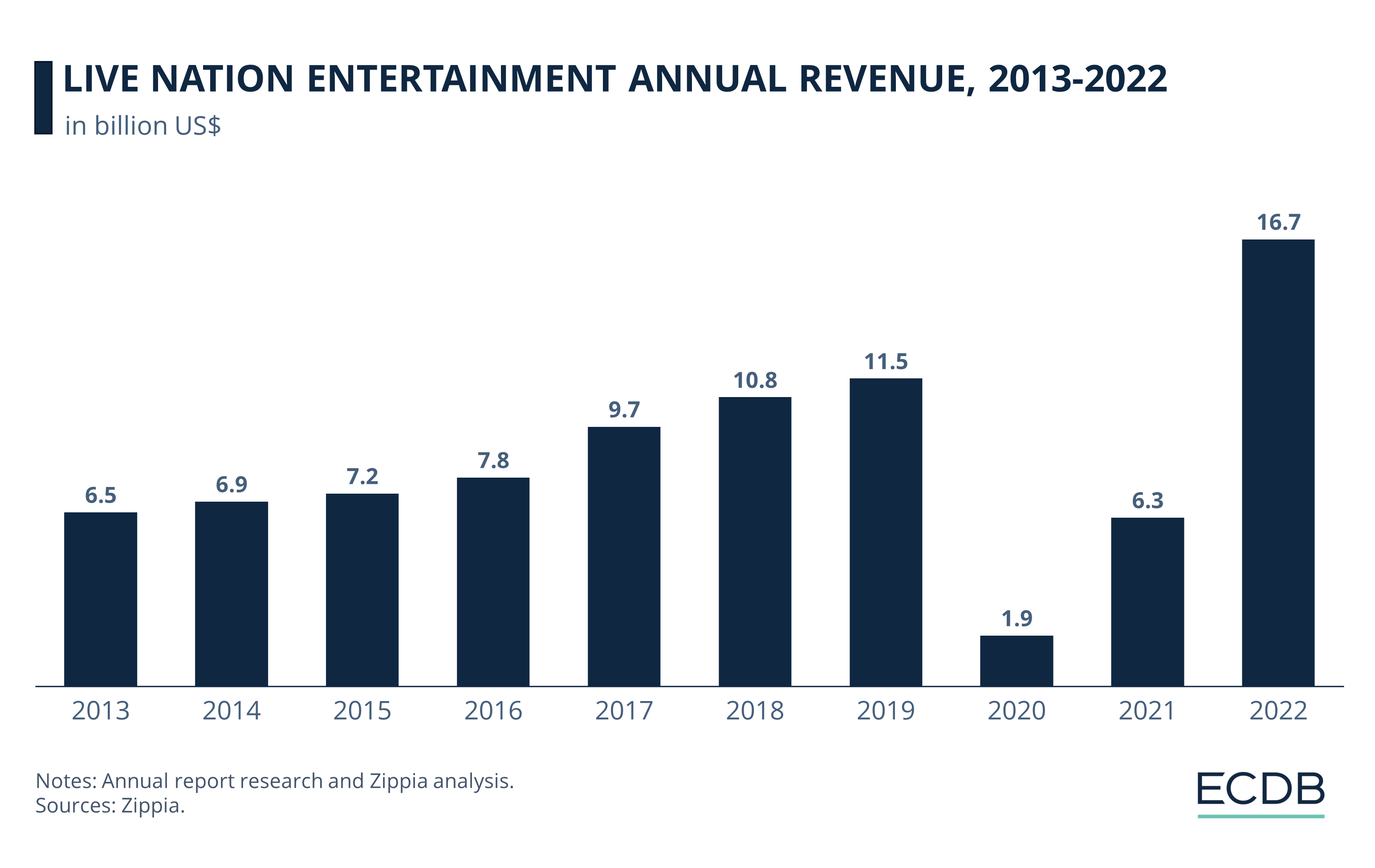
While the company has consistently increased its revenue since 2013, post-pandemic revenues reached a new high of US$16.7 billion in 2022. In the first quarter of 2023, Live Nation Entertainment posted a quarterly revenue of US$3.1 billion, representing a 73% increase over the previous year. This is due in no small part to hosting the Taylor Swift concert tour, which fans are willing to pay top dollar to see.
Partnerships and Exclusive Deals Secure Market Position
Another strategic move is the integration of social commerce into the business. In August 2022, Ticketmaster partnered with TikTok to enable event discovery combined with the ability to purchase tickets through the app. This is in addition to a collaboration with PayPal as Ticketmaster’s preferred payment partner, which aims to make it easier for consumers to buy tickets and provide them with additional benefits such as included parking and merchandise.
As the online event ticketing market continues to grow, a strategy focused on prioritizing the consumer experience through convenience and innovation proves most lucrative. Consumers demonstrate a willingness to pay premium prices for coveted front-row seats at their favored events, ultimately driving the sector's growth.
Online Ticketing Market: Closing Remarks
The online ticketing market has shown a rapid recovery from the decline in sales during Covid. As online platforms make it increasingly convenient to purchase event tickets online, industry outlook points to continued expansion. This shift to online event ticketing is capitalizing on increasing consumer demand to attend top events, while ticket brokers are prioritizing mobile accessibility and technological innovation to improve the experience.

Click here for
more relevant insights from
our partner Mastercard.
Related insights
Deep Dive
Valentine’s Day Drives eCommerce Revenues for Flowers & Gifts
Valentine’s Day Drives eCommerce Revenues for Flowers & Gifts
Deep Dive
Shopify Is the Most Used Shop Software Globally, But Magento Dominates in Europe
Shopify Is the Most Used Shop Software Globally, But Magento Dominates in Europe
Deep Dive
Why the Online Pharmacy Trend Has Continued Beyond the Pandemic
Why the Online Pharmacy Trend Has Continued Beyond the Pandemic
Deep Dive
Why eCommerce and Luxury Sales Are Tough to Unite
Why eCommerce and Luxury Sales Are Tough to Unite
Deep Dive
What Countries Are Driving Revenues in the Global Online Smartphones Market?
What Countries Are Driving Revenues in the Global Online Smartphones Market?
Back to main topics
